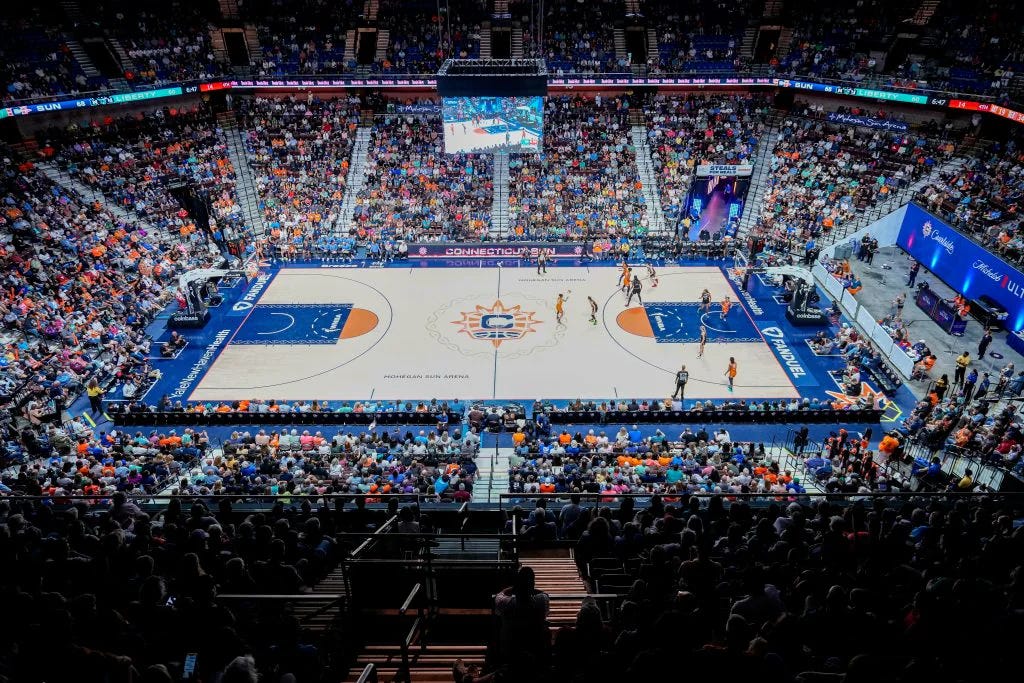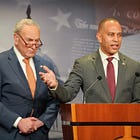The Sun’s future and the fight for pay equity put the WNBA under Congress’s glare
From Connecticut’s senators battling to keep the Sun in state to House Democrats demanding fair treatment for players, lawmakers are turning the WNBA’s power struggle into a political flashpoint.

The Connecticut Sun’s regular season ended in disappointment Wednesday evening with a 16-point loss to the Atlanta Dream. But the real drama begins this offseason, when the WNBA team’s future in the state will be decided by a high-stakes ownership battle now drawing scrutiny from Capitol Hill and threatening to test the limits of the league’s power.
With the WNBA accused of pressuring the Mohegan Tribe to accept a below-market bid that could move the team out of state, Connecticut’s congressional delegation has stepped in to defend both the franchise’s future and the principle of fair competition. Democratic Sens. Richard Blumenthal and Chris Murphy are leading the state’s lawmakers in warning the league against overreach, casting the fight as a test of antitrust law, community loyalty and the broader struggle for equity in women’s sports.
“I’m calling a foul on the WNBA because it’s interfering with Connecticut’s efforts to keep the team in Connecticut. They have built a fan base and level of support that is just extraordinary,” Blumenthal told me in an interview at the Capitol this week. “The players have to follow the rules on the court. The WNBA should follow the rules of law, not just throw its weight around and try to strong-arm the team to move elsewhere.”
The Mohegan Tribe, which has owned the Sun since 2003, began exploring options to sell the team after more than two decades of stewardship. The franchise, now worth hundreds of millions of dollars, had just achieved a milestone by selling out its 2025 season tickets for the first time in history.
A Boston-based group quickly emerged with a reported $325 million offer, sparking speculation that the Sun could relocate north. While framed as a near-done deal by some, the Mohegan Tribe made clear it preferred to keep the team in Connecticut. Around the same time, a local Hartford group matched Boston’s bid. It proposed splitting home games between Uncasville and Hartford, with state leaders pledging investment in a new practice facility and the use of Hartford’s PeoplesBank Arena to secure the franchise’s long-term growth.
Meanwhile, a Trump-backed billionaire reportedly submitted a competing $250 million bid—significantly lower than the Boston and Hartford offers—while angling to move the team out of the Northeast to cities like Cleveland or Houston. Critics said the offer was a low-ball attempt to leverage political influence within the league’s governance structure to override the tribe’s wishes.
Blumenthal responded with a sharply worded letter to Commissioner Cathy Engelbert, accusing the WNBA of interfering in the sale. He warned that any effort to block Connecticut-based ownership could run afoul of federal antitrust laws, citing the Sun’s two decades of success under the tribe’s stewardship as evidence of the state’s deep commitment to the franchise.
Sports leagues have long wrestled with antitrust law. Major League Baseball enjoys a century-old exemption that shields it from relocation and labor challenges, while the NFL and NCAA have both been forced by the courts to scale back restrictive practices. The WNBA has no such protection. If the league is using its authority to block higher bids and steer the Sun’s sale toward a politically connected buyer, Blumenthal argues it could be crossing into monopoly behavior that leaves it vulnerable to the same legal scrutiny other leagues have faced. As a senior member of the Senate Judiciary Committee, he pledged to keep close watch on the negotiations and vowed to pursue investigations if the league tried to tilt the outcome.
His intervention followed Murphy’s own salvo in a social media thread accusing the WNBA of trying to force the Mohegan Tribe into a sweetheart deal with a Trump-aligned buyer. Murphy argued that the Hartford bid not only matches the financial terms of Boston’s but would strengthen Connecticut’s claim as the “basketball capital of the world” while keeping the Sun rooted in its loyal fan base. By contrast, he said, the Trump-backed offer seeks to uproot the team on the cheap.
While Connecticut’s senators are focused on keeping the Sun in the state, House Democrats are also seizing on the moment to highlight broader inequities in women’s sports.
The Democratic Women’s Caucus is using the looming WNBA collective bargaining talks to pressure the league on fair pay and revenue sharing, tying the ownership fight to the wider struggle for gender equity both on and off the court.
In a separate letter to Engelbert, 85 members warned that the league’s drawn-out negotiations with players risk undermining not only the league’s success but also the fight for gender equity in sports. Lawmakers pointed out that while players submitted proposals months ago, the WNBA only formally responded this summer—and a highly anticipated July session in Indianapolis during the league’s all-star weekend was described by players as a “wasted opportunity.”
The timing, they argue, couldn’t be worse.
The league is riding high on record attendance, surging merchandise sales, lucrative new TV rights, and franchise valuations that have nearly doubled. Yet none of that money, they note, is being shared directly with the players who built the product. Unlike the NBA, NFL, and NHL—where athletes share in the leagues’ revenues—WNBA players get no cut of ticket sales, sponsorships or broadcast deals.
“Currently, the league is not addressing players’ needs,” DWC Chair Teresa Leger Fernandez (D-N.M.) said in a press call this week with union leaders from the WNBA and AFL-CIO. “These women have made massive strides and are the future of sports. Their games are exciting and drawing viewers exponentially. But their contributions are not valued and their value is not paid.”
A spokesperson for the WNBA could not be reached for comment.
The WNBA’s ongoing collective bargaining battle is inseparable from the broader gender pay gap in American society. Women in the United States still earn on average about 82 cents for every dollar paid to men, and the disparities are sharper for women of color. After decades of slow, uneven progress, the pay gap has actually widened in recent years, raising alarms among economists and lawmakers alike.
Advocates and lawmakers like those in the DWC see the fight as emblematic of women’s labor struggles across the economy, where women drive record growth in an industry, only to see the gains captured disproportionately by corporate structures rather than the workforce. It’s this context that gives the CBA talks heightened political resonance. A lopsided deal would reinforce the very inequities Democrats argue they are battling on Capitol Hill. At the same time, a stronger revenue-sharing agreement could signal progress not just for athletes but for women workers writ large.
This week isn’t the first time WNBA players have made clear what’s at stake.
As I reported this story, I thought back to the Las Vegas Aces’ visit to the White House last year to celebrate their 2023 championship.
Forward Alysha Clark—now with the Washington Mystics—told me her first bill as a lawmaker would be simple: “Everybody doing the same job needs to be paid equally.”
Three-time MVP A’ja Wilson warned that talk of the gender pay gap couldn’t just be a passing trend, adding, “Put your money where your mouth is and really try to make those changes.”
Those words still echo today as lawmakers press the WNBA to show it values its players, its fans, and its teams as more than bargaining chips in backroom deals.




